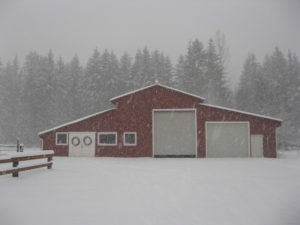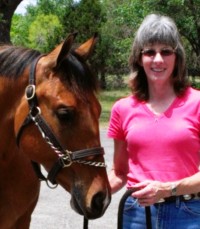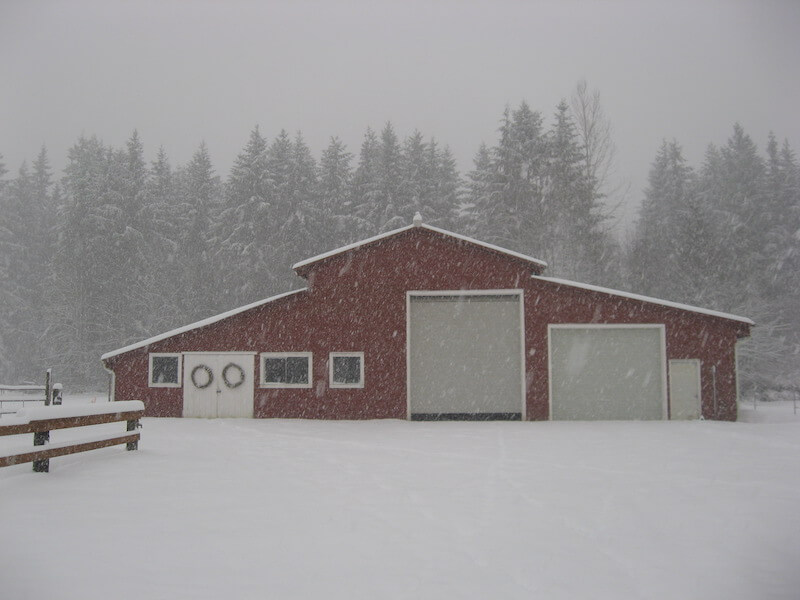Caring For Horses During the Winter
by Eleanor Blazer

The holidays are over and most of us are hunkered down, just waiting for spring. This time of year it takes motivation to leave the house, trudge to the barn and care for horses, but once there the smell, sound and sight of furry best friends warms the heart. Not to mention the exercise you get grooming, cleaning stalls and doing chores. No matter what the weather is like, caring for horses is good for the mind and body.
Remember to pay extra attention as you work around your horses, observing their condition and behavior. Simple observation can help prevent small problems from becoming bigger challenges. Run your hands over their bodies. Do you feel any lumps, rough patches of skin, heat or swelling? A fungus (especially if you blanket) could be growing. Unseen injuries, hidden by long winter hair or blankets, may also be present. Treat problems as soon as you discover them.
Horses can lose or gain weight in the winter without anyone noticing. Do you feel ribs or a light layer of fat? Can you not feel ribs at all? Don’t rely on visual inspection as winter hair or blankets easily mask changes. Feel the horse for a body score; depending on how your horse is kept, it may need extra feed to stay warm. Do this often so you can make appropriate adjustments before the horse gains or loses too much weight.
Pay attention to your horse’s hooves during the winter and clean them often, daily if possible. Notice if there is a foul smell. Thrush (infection of the hoof, especially in the frog) is very common during winter months. If thrush is detected, the area must be cleaned, treated with a thrush remedy and the hoof kept clean and dry. Treatment must continue until the infection is completely gone. Even though you may not be riding as much, don’t neglect having your horse’s hooves trimmed or re-shod during the winter months. It doesn’t take long for a hoof to become unbalanced, but it can take months to regain it.
Your horse’s legs should also be observed carefully. Inspect the back of the pasterns for scratches, a fungus that causes crusty scabs and open sores. If you detect the fungus, clean and treat the area. Constant exposure to wet conditions will hinder the healing process. Several treatments are available. The best one I’ve used is SMZ/TMP (Sulfamethoxazole/Trimethoprim) tablets dissolved in water to make a paste and applied to the area, then a standing bandage applied. This must be done twice a day and the area kept clean and dry.
Another simple observation is the condition of your horse’s manure. Is it normal for that particular horse? Abnormally dry, hard manure can be a sign of dehydration. Dehydration may also cause the manure to have a coating of mucus on it. Stall cleaning is a natural time to take note of this sort of thing.
Water is the most important nutrient and the most neglected, particularly during winter. Water buckets, cups and stock tanks must be kept clean and free of ice. Impaction colic is very common during the winter due to the lack of fresh, clean, available water. Check the water source twice a day.
Before long spring will be here. Make sure your horse is ready for the long awaited event by ensuring they remain healthy through the winter.
For information about caring for and feeding horses take the online courses “Stable Management” and “Nutrition for Performance Horses” taught by Eleanor Blazer. Earn certification or work toward a Bachelor of Science degree in equine studies. Go to www.horsecoursesonline.com for more information. Visit Eleanor’s web site at www.thewayofhorses.com.
Published January 2014 Issue

Eleanor Blazer was raised training and caring for horses. She learned to ride and care for the horses her family bought and sold. Many of these horses required improved nutrition when they arrived for training. Eleanor’s experience and research has benefited both horses and horse lovers in the field of equine nutrition. An equine nutrition consultant, based in Bulverde, Texas, she keeps busy doing equine nutrition consultations, conducting seminars, and speaking to youth groups about horse care and nutrition. Eleanor is the author of the syndicated column The Way of Horses. She has more than 20 years experience helping and being a mentor to those wanting to know how to provide the very best care and nutrition for our special friend – the horse.






